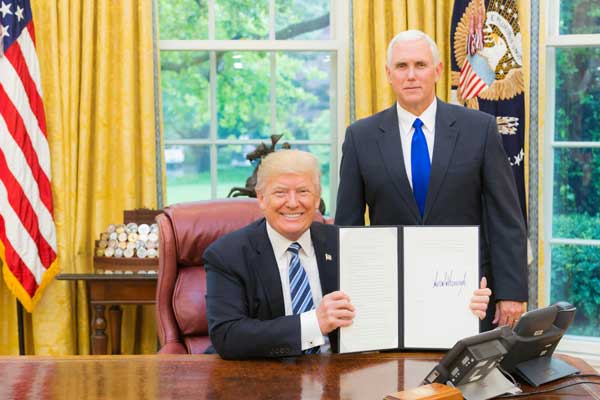Senate passes Trump’s “Big Beautiful Bill” amid fierce debate over economy, environment, and debt

[Donald Trump holds up the signed bill. Photo Credit to Unsplash]
In a dramatic and closely watched vote late Tuesday night, the U.S. Senate approved President Donald Trump’s signature legislative package, officially titled the “One Big Beautiful Bill” (OBBB).
The final count was 51 to 49, with every Republican in favor and all Democrats against.
The measure now heads to Trump’s desk and is expected to be signed into law in the coming days.
The OBBB combines permanent corporate tax cuts—from 21 percent to 15 percent—with temporary middle‑class tax relief for households earning under $200,000, set to expire in five years.
The bill allocates over $1 trillion for infrastructure and energy projects, including highway repairs and rural broadband expansion, while also increasing defense spending by approximately $150 billion.
Key regulatory rollbacks for the Environmental Protection Agency and other agencies are also part of the package, aimed at speeding approval processes for energy and construction projects.
Speaking at a Pennsylvania event, President Trump stated, “We’re back in Pittsburgh to announce the largest package of investments in the history of the Commonwealth of Pennsylvania, and it’s not even close.”
He went on to explain that the bill would help bring back jobs, enhance American energy production, and strengthen national prosperity.
Critics across the aisle disagreed.
Republican lawmakers praised the bill’s tax cuts and infrastructure funding.
However, not all Republicans were supportive.
Senator Tom Tillis complained as he spoke on the bill, “What do I tell 663,000 people in two years, three years, when President Trump breaks his promise by pushing them off of Medicaid because the funding’s no longer there anymore?”
Economic analysts and fiscal watchdogs were quick to weigh in.
The Congressional Budget Office estimated that the bill would increase deficits by roughly $2.4 trillion over the 2025-2034 decade.
MoneyWeek reported that the legislation could leave up to 11.8 million people uninsured by 2034 as healthcare and clean‑energy programs lose funding.
Reuters and The Guardian confirmed the CBO’s projection of a $3.3 trillion deficit increase and noted that Senate Republicans used a procedural vote to advance the plan.
Even private sector giants have spoken out.
Tech billionaire Elon Musk took to X on June 28 to criticize the bill, saying “the latest Senate draft bill will destroy millions of jobs in America and cause immense strategic harm to our country… It gives handouts to industries of the past while severely damaging industries of the future.”
Trump responded publicly via a video released in June, expressing surprise and dismissing Musk’s remarks as driven by “Trump Derangement Syndrome.”
Public reaction remained sharply divided.
Voters in rural and industrial regions welcomed the promise of new infrastructure and energy jobs, while urban and coastal residents voiced concern over environmental cuts and growing inequality.
Democrats have called for reforms — notably proposing to abolish the debt ceiling in light of the bill’s expansive borrowing.
Meanwhile, critics warn that rising debt and weakened environmental protections could lead to economic instability similar to historical financial collapses.
As the president prepares to sign OBBB, political observers agree the legislation will define the 2026 midterms.
The bill’s passage sets up a clear choice for voters ahead of the 2026 midterm elections.
Supporters argue the legislation will stimulate growth, modernize infrastructure, and reassert American economic leadership.
Critics, however, warn that the bill favors corporations and the wealthy, weakens environmental safeguards, and adds an estimated $3.3 trillion to the national debt.
With the country sharply divided, the bill’s long-term impact—economically, politically, and environmentally—remains to be seen.

- Joseph Shin / Grade 12 Session 9
- Valley Christian High School

![THE HERALD STUDENT REPORTERS [US]](/assets/images/logo_student_us.png)
![THE HERALD STUDENT REPORTERS [Canada]](/assets/images/logo_student_ca.png)
